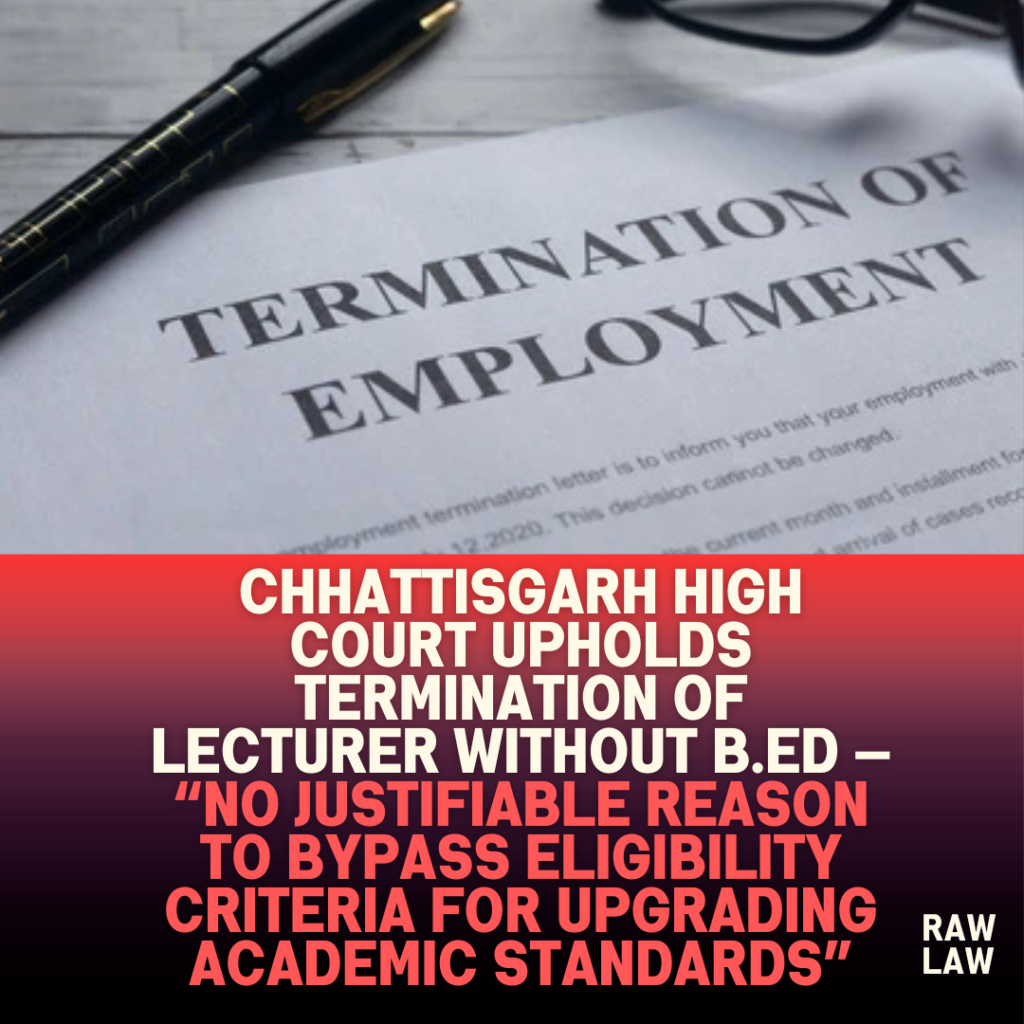Court’s Decision
The Chhattisgarh High Court dismissed an intra-court appeal challenging the Single Judge’s order upholding the cancellation of a lecturer’s appointment due to the absence of a B.Ed degree, a statutory requirement under the Right to Education Act and applicable service rules. The Division Bench agreed with the Single Judge’s finding that there were more meritorious candidates on the waitlist and that bypassing the eligibility criteria was unjustifiable. The Court also upheld the quashing of the recovery of ₹96,632 towards salary paid for the period the appellant worked, given the absence of communication of the termination order, thus balancing equities while sustaining the termination.
Facts
The appellant, initially a waitlisted candidate, was appointed on 09.04.2015 as a Lecturer in a Government Higher Secondary School in Dhamtari district. Soon after, the Chief Executive Officer cancelled her appointment on 13.04.2015 upon discovering she lacked the mandatory B.Ed qualification. The appellant claimed the termination order was never communicated, and she continued to work for over six months. She approached the High Court in 2015, which directed her to file an appeal before the Divisional Commissioner. The Commissioner allowed her appeal on 08.04.2016, setting aside the termination. This was challenged by the CEO before the Secretary, Panchayat and Rural Development Department, who restored the termination and directed disciplinary action against officials who appointed non-qualified candidates.
The appellant then filed a writ petition in 2021, which was dismissed by the Single Judge on 17.03.2025. The Single Judge held she was ineligible for the post under statutory rules but quashed the recovery of salary for the period worked. The current writ appeal challenged that dismissal.
Issues
- Whether the cancellation of the appellant’s appointment without a departmental inquiry was valid.
- Whether the lack of a B.Ed degree justified termination despite her appointment by the Selection Committee.
- Whether the order quashing recovery of salary was correct in light of the appellant having worked without knowledge of termination.
Petitioner’s Arguments
The appellant argued that her selection was based purely on merit by a competent Selection Committee, and neither the Chief Executive Officer nor the Secretary had appellate authority over such decisions. She contended that no charge sheet was issued, nor was due process followed, making the termination illegal. She relied on the precedent in Rohini Jha v. State of Chhattisgarh , where the Court held that Panchayat Department employees cannot be dismissed without a departmental enquiry as per Rule 7 of the 1999 Rules. She also claimed the Single Judge overlooked the 2018 order directing disciplinary action against officials responsible for illegal appointments and failed to set aside her termination accordingly.
Respondent’s Arguments
The State argued that the appellant was indisputably ineligible as she did not possess a B.Ed degree, a statutory requirement for teaching positions under the Right to Education Act and relevant rules. There were around 35 more qualified candidates on the waitlist, making her appointment unjustifiable. The authorities acted within the law in terminating her appointment, and the Single Judge rightly found no illegality warranting interference.
Analysis of the Law
The Court noted that the eligibility requirement of a B.Ed degree or a diploma in education is embedded both in the Right to Education Act and in the service rules governing teaching positions. These provisions ensure academic standards and cannot be bypassed. While Rule 7 of the 1999 Rules provides procedural safeguards in misconduct cases, the present termination was on the ground of ineligibility, not misconduct.
Precedent Analysis
The appellant’s reliance on Rohini Jha was distinguished. In Rohini Jha, the Court dealt with termination on misconduct grounds, requiring a formal enquiry. Here, the ineligibility arose from the absence of a statutory qualification, making the termination a matter of law rather than a disciplinary proceeding. The precedent thus did not aid the appellant.
Court’s Reasoning
The Division Bench endorsed the Single Judge’s findings that:
- The appellant lacked the mandatory B.Ed qualification.
- Multiple more qualified candidates were available on the waitlist, and there was no justification for bypassing eligibility criteria.
- Under statutory and policy considerations, ensuring qualified teachers for upgrading academic standards is a legitimate and necessary objective.
- The recovery of salary was rightly quashed since the appellant served for over six months without knowledge of her termination, and no fault lay on her for that period.
Conclusion
The Court dismissed the writ appeal, holding that there was no perversity, arbitrariness, or illegality in the Single Judge’s decision. The appellant’s termination stood, but she retained the right to keep the salary for the period served.
Implications
This judgment reinforces that statutory qualifications in the education sector cannot be waived, even if an appointment is made by a selection body. It also clarifies that while equity may protect an employee’s earned salary where termination communication is defective, such considerations cannot override mandatory eligibility rules.
FAQs
1. Can an appointment be cancelled after joining if the candidate lacks a statutory qualification?
Yes. If a statutory qualification is absent, the appointment is voidable, even after joining, as eligibility rules are mandatory.
2. Does the absence of a departmental enquiry make termination illegal?
Not when the ground for termination is ineligibility rather than misconduct. Ineligibility is a matter of law, not disciplinary procedure.
3. Can salary be recovered if an employee works after termination without being informed?
No. If the termination is not communicated and the employee works in good faith, courts may allow retention of salary for that period.



